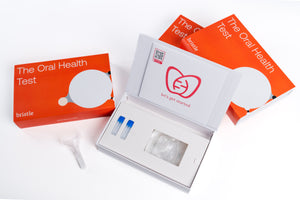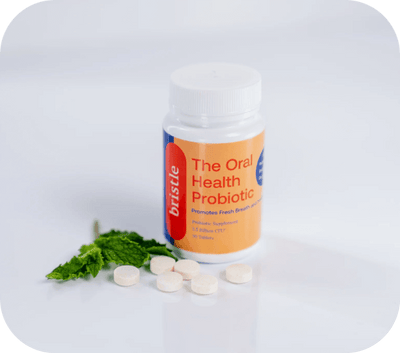No one enjoys the embarrassment of seeing others pinch their noses while they're talking or outright being told their breath smells. Despite routine hygiene efforts, bad breath can still persist and may be a sign of more significant underlying dental health issues, such as gingivitis.
In this article, we'll dive deeper into gingivitis, a common cause of bad breath.
What is gingivitis and what causes it?
Our mouths and oral cavity have a diverse community of bacteria, fungi, and viruses, collectively known as our oral microbiome. When our oral microbiome is balanced, it helps fend off bacterial infection, break down food, and even help with reducing our blood pressure.
When our microbiome is unbalanced, harmful bacteria can grow in number and infect our gums, releasing toxins that lead to inflammation and gum disease.
Gingivitis, or gum inflammation, is a mild form of gum disease. Signs of gum disease include red, swollen, tender gums, or bleeding gums. If left untreated, gingivitis can progress to more serious gum diseases such as periodontitis (periodontal disease) and tooth loss, which often require much more aggressive treatment options. Gingivitis is most commonly caused by poor oral hygiene leading to a buildup of bacteria, but thankfully, it can be reversed with proper treatment.
Gingivitis can also be caused by
How can I prevent gingivitis?
The best defense against gingivitis is proper brushing and flossing or other interdental (between the teeth) cleaning methods. When we aren't practicing proper hygiene, an invisible film of bacteria forms on our teeth, becoming plaque.
This plaque eventually hardens around the lining of the gum at the base or between teeth and progresses into what is known as calculus, or tartar. This forms a protective barrier or haven for harmful bacteria to reside and flourish.
The longer the buildup of plaque and tartar go untreated, the more time bacteria have to irritate the gums and cause inflammation and tooth decay (cavities). If left untreated for long periods, this inflammation can progress to periodontal disease, a serious dental health issue that is irreversible.
How does gum disease cause bad breath?
Many of the same species of oral bacteria that cause gum disease also release byproducts called volatile sulfur compounds (VSCs), which have a foul smell.
As these species grow in number, they produce higher levels of VSCs, which worsens bad breath symptoms. Two of these VSCs include hydrogen sulfide (smells like rotten eggs) and methyl mercaptan (an unpleasant rotten cabbage smell).
So as gingivitis remains present, so will the bacteria that lead to bad breath.
I've been diagnosed with gingivitis, now what?
Thankfully gingivitis is still treatable, but it's time to take your oral hygiene seriously. Brushing teeth at least twice daily, in the morning and before going to bed, and regular flossing or interdental cleaning at least once daily are essential steps to improving your oral health.
Clearing away those bacterial films, plaques, and tartar, along with the removal of food particles between teeth that serve as the bacteria's nutritional sources, should be the core of your care plan.
The oral bacteria that produce VSCs are also commonly found on the tongue, so using a tongue scraper can help reduce bad breath symptoms.
Additionally, good health practices such as staying hydrated to prevent dry mouth, avoiding sugary foods, and seeing your dentist or dental hygienist regularly for professional cleanings and early detection of gum inflammation can help prevent progression to more worrisome problems.
Is there anything else I can do to learn about my oral health and the risk of gingivitis?
Regular dental care visits and dental cleanings are essential for maintaining good oral health.
Good personal oral hygiene practices at home can be the most significant determinant of your oral health because daily cleaning and removal of food particles are critical to prevent a buildup of bacteria.
Finally, if you'd like to learn more about your oral microbiome and whether you're housing those harmful bacteria that cause gingivitis and bad breath, testing your saliva can offer tremendous valuable information.
The Bristle Oral Health test analyzes your saliva to measure the levels of good bacteria and those that cause bad breath and gum disease, then matches you with a treatment plan based on your results.












